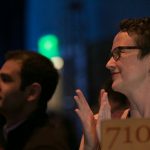For non-speakers, a league of their own
2016 Medicine X main stage speaker Dillan Barmache is taking his message of empowerment to Motormorphosis, a conference fostering communities of non-speakers in the digital age.
Being different is never easy. But for people who can’t speak — and who struggle with the gross motor skills necessary to communicate in other ways — the sense of isolation that comes from living in a world that revolves around verbal conversation can be devastating.
Today, thanks in large part to social media, non-speakers around the world are finding each other and creating communities where they can share stories and resources. Many of them gathered in Virginia on July 21 for Motormorphosis, a first-of-its-kind conference tailored to non-speakers, their families and the professionals who work with them.
Until now, non-speakers could attend conferences designed for the disabled population generally or for specific conditions like autism or Down syndrome.
“There are a gazillion conferences that have to do with special education,” says Elizabeth Vosseller, the director of Growing Kids Therapy Center in Virginia and a co-organizer of Motormorphosis. “But there’s a void when it comes to conferences in support of non-speaking individuals. Our goal is to fill that.”
Among the highlights of the two-day event: a panel discussion that will feature Dillan Barmache, a 2016 Medicine X main stage speaker who communicates primarily via an iPad.
Also participating: Brent Sullivan, an adult with autism who spent most of his life in silence until he learned to use a letterboard at the age of 45.
“Non-speakers are a population that falls through the cracks,” says Vosseller, noting that statistics on the number of people who can’t speak as a primary form of communication don’t exist. In the medical community, there isn’t even a consensus on whether non-speakers who also lack gross motor skills can be taught to convey thoughts and feelings, or what the best tools might be to help them do so.
In response, Vosseller — along with her wife, Christine Vosseller — formed in March the Nonspeaking CommUnity Consortium, a non-profit led by parents, professionals and non-speakers that aims to support non-speakers and their supporters through education, research and advocacy.
“There’s more work that needs to be done,” says Vosseller, “but we are starting to unite and build a global community.”
ABOUT MEDICINE X | CITIZEN: To be a #medx citizen is to have a voice, no matter who you are. CITIZEN aims to be a guide to the people and action in the Medicine X community that are shaping the evolving health care conversation. Entries in this series are not an endorsement of the people or actions featured.




